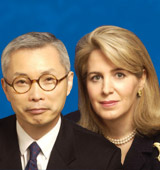|
Executive Interviews: Interview with W Chan Kim & Renee Mauborgne on Blue Ocean Strategy
December 2008
-
By Dr. Nagendra V Chowdary
-
Can any company create a blue
ocean, or is this possible only in new
or relatively uncrowded industries?
Of course any company can create a
blue ocean regardless of industry or
market conditions. Conventional or
red ocean strategy assumes that an
industrys structural conditions are
given and that firms are forced to
compete within a finite market space.
In contrast, with blue ocean strategy
there is scarcely an attractive or
unattractive industry per se because
the level of industry attractiveness
can be altered through companies
conscientious efforts.
|
|
Recognizing
that structure and market boundaries
exist only in managers minds,
companies that hold this view do not
let existing industry or market
structures limit their thinking. -
How should firms go about
creating new market spaces? What
should be the road map and the level
of external intervention (for example,
from consultants) required for
getting BOS journey right?
The goal for the firm is to pursue
value innovation a leap in value for
buyers and company alike. This
comes from the simultaneous pursuit
of differentiation and low cost. The
following questions are helpful in
looking for blue ocean opportunities:
- Which of the factors that the
industry takes for granted should be
eliminated?
- Which factors should be reduced
well below the industrys standard?
- Which factors should be raised well
above the industrys standard?
- Which factors should be created that
the industry has never offered before?
Blue ocean strategy then asks how
can I create exceptional buyer utility that will change the lives of the mass
of the market? Once answered, they
ask, what is the price that will unlock
the mass of buyers? Here you have
achieved your value proposition.
Next, given the strategic price,what is
the cost target I need to achieve to
make a tidy profit? This is the profit
proposition. Finally they ask, what
are the adoption hurdles to executing
my strategy and how do I overcome
them? This is the people proposition.
The moment you sit back and say
how you can create a whole new
industry, by asking just a few simple
questions, then you start to shift your
strategic mindset. All industries are
created not by big resources but by big
ideas. Blue Ocean Strategy proposes a
different approach whereby a new
market space is built by cognitively
reordering and reconstructing the
existing market realities and existing
data in a fundamentally new way.
-
The entire strategy edifice is built
on competition and how to stay
ahead of competition. A lot has been
written on these themes. Bruce D
Henderson, whose chair
professorship you hold at INSEAD,
in one of his articles (The Origin of
Strategy , HBR, Nov Dec, 1989)
made a clear distinction between
natural competition and business
competition and exhorted the
companies to look for differentiating
factors to stay ahead of competition.
However, one of the strongest
advocated themes of BOS is making
competition irrelevant. Is it also not
true that a healthy competition can
propel better value innovations and
benchmarking practices?
First, we must say that practicing
competitive strategy, or what we call
Red Ocean Strategy, is essential to the
success of a business. One still must
compete in the marketplace.
However, competitive strategy often
makes companies too focused on
benchmarking against the
competition, focusing on their
existing assets and capabilities, and
generally trying to react to the
circumstances of their industry.
These are the most common mistakes
companies make in formulating their
strategies. To avoid these mistakes,
we ask companies who want to go
through the Blue Ocean Strategy
process to first put aside any
preconceived notions of their own
assets, capabilities, geographical, or
macroeconomic constraints. We
believe that the moment you take an
environmentally deterministic view
of your company you are a captive of
your environment. Companies find
this challenge inspiring. Learning to
think differently about opportunities
and risks, daring to move forward
into the future, that is what keeps
people and companies alive, young,
and growing.
1.
Business Strategy Case Studies
2. ICMR
Case Collection
3.
Case Study Volumes
|
